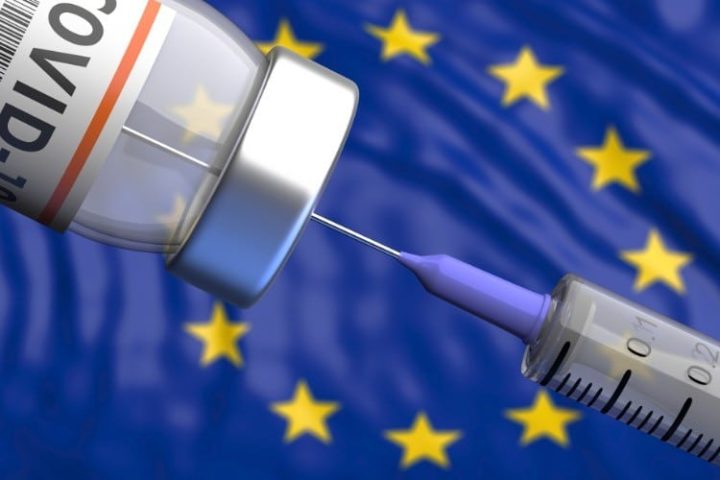
European Union countries should consider mandatory COVID vaccination against the new Omicron variant as part of a “common approach” to the pandemic, said European Commission President Ursula von der Leyen.
Speaking at a news conference on Wednesday, von der Leyen said that the new strain of the virus is worrisome, and while there is little knowledge about it, EU countries should double down on their pandemic measures.
“At this point we don’t know a lot about this variant [Omicron], but we know enough to be concerned,” von der Leyen said, mentioning multiple mutations of the virus. She continued, “until we know what is going on, and this will take two to three weeks, the scientists tell us, we need to do everything possible to make the best out of the time until we have certainty about the characteristics of transmissibility and severity of Omicron.”
While two or three weeks seem like a short period of time, in a time of pandemic it is “an eternity,” therefore the EU members need to “vaccinate, boost, distance, trace as much as possible during that time,” von der Leyen stressed. “Hope for the best, prepare for the worst,” she added.
Out of all pandemic measures, vaccinations and boosters are the most important components since they provide “the strongest protection,” per von der Leyen, who believes Europe is now “at war with the virus.” However, it will be hard to win with nearly one-third of the European population remaining unvaccinated. That means, presumably, that these people are on the side of the virus, according to the EU Commissioner. While she admitted that not all of them can be vaccinated, such as very young children and people with medical exemptions, “the vast majority” can.
“I think it is understandable and appropriate to lead this discussion now that we can encourage and potentially think about mandatory vaccination within the European Union. This needs discussion. This needs a common approach. This discussion needs to be led,” von der Leyen insisted.
The EU does not possess the legislative power to force countries to implement vaccine mandates. Therefore, it will work with member states to negotiate a common pandemic-related strategy.
Various European countries are already increasing their efforts to coerce people to getting inoculated with experimental gene therapeutics.
The most recent examples include Greece imposing a vaccine mandate on all citizens who are 60 and older, threatening those who don’t get the jab with a recurring monthly fine of €100 ($113), starting on January 16.
“It is not a punishment,” said Greek Prime Minister Kyriakos Mitsotakis, “I would say it is a health fee.”
Also on Tuesday, Germany’s incoming chancellor, Olaf Scholz, backed enforcing a mandate across the country. Such a measure would have to be approved by the German Bundestag, where talks on that are already occurring. If an agreement is reached, mandatory vaccination could come to Germany at the beginning of February. The measure is popular among the leaders of some of the German states, including Bavaria and Lower Saxony, who call it “the only chance” to end the pandemic.
In late November, Austria became the first Western country to announce compulsory COVID vaccination for all eligible citizens, starting in February. While the penalties for violations are still being worked out, according to a draft of the legislation aimed at regulating the issue, those who refuse to comply with the new rule could face a fine of up to €3,600 ($4,061) or a four-week imprisonment. Further, Austrians who fail to receive their booster shots on time will be fined up to €1,450 ($1,635) or jailed for four weeks.
Almost all European countries are requiring COVID passports to enter indoor public places.
Omicron vs. Vaccines
On Thursday, the European Centre for Disease Prevention and Control (ECDC) released an early risk assessment of the Omicron variant, which is anticipated to spread rapidly across the bloc in the coming months. Will the vaccines that are touted as “the best available weapon” against it work? There are some serious concerns about that, the agency says:
The presence of multiple mutations in the spike protein of the Omicron VOC [variant of concern] indicates a high likelihood of reduction of neutralising activity by antibodies induced by infection or vaccination. Preliminary data suggest that the Omicron VOC may be associated with increased risk of reinfection in South Africa. However, the full extent to which the Omicron VOC evades or erodes existing vaccine- or infection-derived immunity remains uncertain in the absence of in vitro neutralisation data, vaccine effectiveness data, and further data on reinfection in populations exposed to different SARS-CoV-2 variants during previous pandemic waves.
Does this make the variant more dangerous?
According to South African doctors, infection leads to mild cases of COVID-19 with no “prominent symptoms.” According to Angelique Coetzee, the chairwoman of the South African Medic Association who first discovered the strain,
It [Omicron] presents mild disease with symptoms being sore muscles and tiredness for a day or two not feeling well. So far, we have detected that those infected do not suffer loss of taste or smell. They might have a slight cough. There are no prominent symptoms. Of those infected some are currently being treated at home.
At the same time, vaccine rollouts have utterly failed to stop transmission of the previous COVID strains. Moreover, new data showed that infection is increasing in fully vaccinated individuals, according to a medical study published last month in The Lancet.
“Many decisionmakers assume that the vaccinated can be excluded as a source of transmission. It appears to be grossly negligent to ignore the vaccinated population as a possible and relevant source of transmission when deciding about public health control measures,” wrote the researchers.





